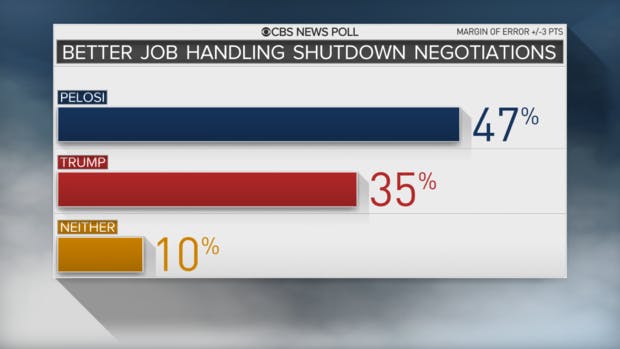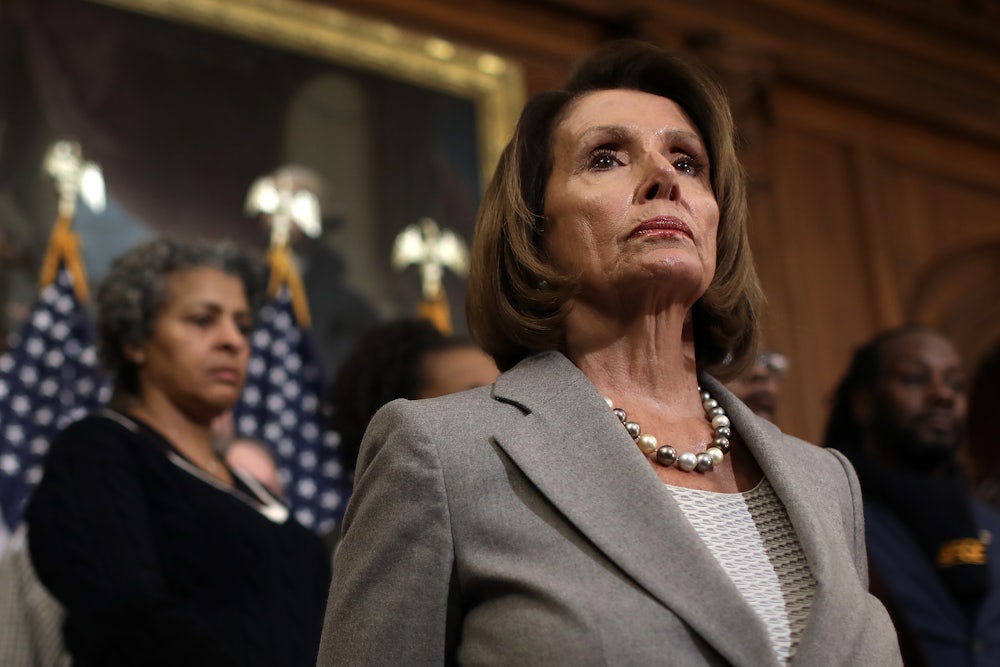Just a few months ago, it seemed like Nancy Pelosi’s bid to become speaker of the House of Representatives was in trouble. While attacks from the right had been commonplace for years, she came under fire from members of her own party, many of who wanted the Democrats to promote a new generation of leaders. Democrats running for their first term in the House from across the political spectrum—Alexandria Ocasio-Cortez on the left, Conor Lamb on the right—kept their distance, while even some incumbents declared that it was time for a change. After Democrats’ landslide victory, CBS News declared Pelosi had a “math problem” because 16 members of her caucus had signed a letter opposing her as speaker.
It all came to nothing. Pelosi swiftly undercut the rebellion, which failed to coalesce around a single challenger, and was easily reelected earlier this month. Now the party’s de facto leader until its 2020 convention, she’s already proving her detractors wrong by dominating President Trump—both on camera and behind the scenes—as only a seasoned, ruthless legislative leader could do. She’s also managed to keep her Democratic colleagues in line, from her more squeamish and less calculating counterpart in the Senate, Chuck Schumer, to the young insurgents who sought her ouster.
Ever since Republicans partially shut down the government over Trump’s demand for border wall funding, Pelosi has followed a simple and effective strategy: Don’t budge an inch. The president is unpopular, the shutdown is unpopular, and a sizable majority blames the former for the latter. Thus, as The Atlantic’s Peter Beinart noted recently, “Republican members of Congress are under more political pressure to back down than their Democratic counterparts, and the longer the shutdown continues, the more that pressure should grow.”
Pelosi knows that she can win this standoff if she holds her caucus together and doesn’t compromise. In accomplishing both thus far, she’s laying waste to Trump’s presidency, preventing him from fulfilling his key campaign promise—the construction of a massive border wall—and pushing him to new lows of unpopularity, while her own poll numbers soar. If she keeps it up, the past month may go down as Pelosi’s greatest political accomplishment—and even redefine her place in American history.
The campaign against Pelosi began in earnest last spring when Lamb, running in a special election for a conservative seat in western Pennsylvania, pledged not to vote for her as speaker. To the surprise of many, he won. Over the ensuing months, dozens of Democrats then distanced themselves from Pelosi on the campaign trail, with many pledging to oppose her return to the speakership.
Congressional leaders rarely poll well. They’re always unpopular with supporters of the rival party, of course, but also with many members in their own party (usually those who want a more radical agenda) and independent voters (who blame the leaders for Congress’s dysfunction). Pelosi, however, has been especially unpopular with the American public, owing to several factors: her gender; her long reign of power; and conservatives’ effective depiction of her as the epitome of the tax-and-spend San Francisco liberal.
But there have been salient criticisms of Pelosi, too. Some Democrats were concerned that she and senior House leadership had not done enough to cultivate new leaders within their ranks. “The notion that there’s no one more experienced than Nancy Pelosi is a self-fulfilling prophecy because you can’t have experience if you can’t gain experience,” one senior Democratic aide told The Atlantic’s Elaina Plott. “Our best members will keep leaving when they continue to see there’s no movement at the top.” When the rebellion against Pelosi fully materialized after the midterms, it rallied around a simple message: She’s too old. It’s time for new blood.
This argument was not particularly persuasive, as I argued at the time, because it was largely being pushed by Democrats from the party’s right wing, like Massachusetts’ Seth Moulton, who were under pressure from voters (and, in some cases, donors) to oppose the San Franciscan. More fatally, the rebellion had its own math problem: It had not rallied around a single leader to challenge Pelosi. So she swiftly won over her caucus, and many of its new progressive incumbents, by offering committee posts and compromises, like a “leadership development” and a pledge to step down in 2022—when she planned on retiring anyway.
Pelosi proved her mettle even before the government shutdown began. During an Oval Office meeting in December with Trump, who had unexpectedly invited TV cameras in an apparent ambush, she and Schumer bamboozled him into taking credit for the looming shutdown. “I will take the mantle,” he said. “I’m not going to blame you for it. The last time you shut it down, it didn’t work. I will take the mantle of shutting down, and I’m going to shut it down for border security.” The press has not allowed Trump to forget that admission, even as he has tried to blame Democrats for the shutdown.
Since the shutdown began 33 days ago, Pelosi has repeatedly stood up to Trump. She has brushed aside his proposals to reopen the government as “nonstarters” because of his insistence on $5.7 billion for the border wall, which she calls “an immorality.” She has pressured him to postpone the State of the Union, scheduled for next Tuesday, over shutdown-related security concerns, which may force him to hold the event elsewhere. She has also largely kept Schumer, who has been criticized by many Democrats for his willingness to work with Republicans, in lockstep. Pelosi had deferred to Schumer during Trump’s first two years in office, but a top Democrat told Politico “the dynamic is changing.”

Americans like what they’re seeing from her. New polling shows that Pelosi’s popularity has jumped. According to polling from Civiqs, Pelosi’s favorability has jumped 13 points among Democrats, from 59 to 72 percent. “It appears, then, that Pelosi’s opposition to the president has rallied her party’s base and increased her favorability ratings,” argued The Washington Post’s Michael Tesler. But it’s not just Democrats who approve of her performance during the shutdown. As a CBS News poll released on Wednesday found, “Among Americans overall, and including independents, more want to see Mr. Trump give up wall funding than prefer the congressional Democrats agree to wall funding. Comparably more Americans feel House Speaker Nancy Pelosi is handling negotiations better than the president is so far.”
Democrats are winning the shutdown thus far because they haven’t compromised—and they have no reason to do so, given the unpopularity of the president and the border wall. The length and severity of this shutdown, now the longest in U.S. history, could do lasting damage to Trump’s presidency. If so, we may be witnessing the pinnacle of Pelosi’s career. She had already proven herself as a resolute obstructionist when she thwarted George W. Bush’s plan to privatize Social Security in 2005. In 2009 and 2010, she proved herself a master legislator when she passed Obamacare, which she helped resuscitate, and the (ultimately doomed) cap-and-trade bill. But given the stakes of the current political moment, the character of the president, and the criticism she has fielded over the past year, her recent performance against Trump will change the story that’s told about her in history books.
Looking ahead to 2020, progressives may yet have reason to be skeptical about Pelosi’s continued hold on the gavel—especially if Democrats win back both the presidency and the Senate. She has, especially recently, shown herself to be cautious when confronting the progressive wing’s increasingly ambitious agenda. She implemented a pay-go rule in the House, requiring new spending to be offset by budget cuts or tax increases. On Medicare for All, she has largely advocated for strengthening Obamacare, but did recently allow hearings on universal health care to go forward. As for Ocasio-Cortez’s Green New Deal, Pelosi does not seem to be a fan: Earlier this year, she rebuffed the freshman’s attempt to form a committee on the proposal. Finally, while she has advocated for younger leaders, she has tended to privilege corporate-friendly centrists like Hakeem Jeffries over progressives like Barbara Lee.
But 2020 is a long way off, and Democrats’ unified control of the government may be an even longer way off. For now, by undercutting and emasculating Trump at every turn, Pelosi is determined to turn the shutdown into the beginning of the end of his presidency. In doing so, she has earned the loyalty of her entire caucus. Winning tends to have that effect.
